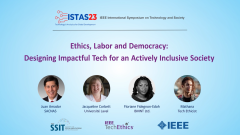One Giant Leap: The Moon Landing's Impact on Humanity | IEEE TechEthics Virtual Panel
About the Video: Fifty years ago, the first manned space mission landed on the Moon. This panel addresses how this historic event influenced the public's views on technology, while also inspiring action and debate on several societal issues.
About the Panelists:
Dr. Allison Anderson graduated with a B.S. in Astronautics Engineering from the University of Southern California in 2007 with a minor in Astronomy. She received an M.S. in Aerospace Engineering and an M.S. in Technology Policy in 2011 from MIT, and a Ph.D. in Aerospace Biomedical Engineering in 2014 from MIT. She received a postdoctoral fellowship from the National Space Biomedical Research Institute to work at Dartmouth Hitchcock Medical Center studying human space physiology. She is currently an Assistant Professor at the University of Colorado – Boulder Smead Department of Aerospace Engineering Sciences and an Adjunct Professor in Integrative Physiology.
Neil M. Maher is a professor of history in the Federated History Department at the New Jersey Institute of Technology and Rutgers University at Newark, where he teaches American environmental and political history. He has published articles in academic journals including Social History, Environmental History, the Western Historical Quarterly, and most recently, Modern American History. His first book, Nature’s New Deal: The Civilian Conservation Corps and the Roots of the American Environmental Movement (Oxford University Press, 2008), received the Charles A. Weyerhaeuser Book Award for the best monograph in conservation history. Maher’s most recent book, Apollo in the Age of Aquarius, which was published by Harvard University Press in 2017, examines the interrelationship between the space race and the grassroots political struggles of the 1960s era, including those involving the civil rights, anti-Vietnam war, environmental, feminist, counterculture, and conservative movements. The book was named a Choice Outstanding Academic Title (2017) and a Bloomberg View Must Read Book (2017), and recently received the Eugene M. Emme best book award from the American Astronautical Society (2017).
Matt Novak writes and edits Gizmodo’s Paleofuture blog, which explores what people of the past thought about the future. Novak regularly writes about humanity’s greatest hopes and darkest fears. Paleofuture looks at the jetpacks, flying cars, and meal pills of yesterday but always tries to dig deeper in order to understand why people longed for those things. Or, in the case of our greatest apocalyptic fears of technology, why people worried about those things. Novak started the Paleofuture blog independently in 2007 while a student at the University of Wisconsin-Milwaukee and the website previously lived at Smithsonian magazine from 2011 to 2013. Originally from the United States, Novak currently lives in Australia and is writing a book about all the movies that American presidents watched while they were in office.
Mark A. Vasquez (moderator) is a Certified Association Executive (CAE) with over 25 years of experience in association management at IEEE. He currently serves as the program manager for IEEE TechEthics (techethics.ieee.org), a program that has been launched to drive conversations about the ethical and societal impacts of technology. In this capacity, he works to develop relationships with others in the technology ethics community, produces events, convenes thought leaders, and more. Mark is an engineering graduate of The Cooper Union.
Recorded on 19 March 2019 as part of the IEEE TechEthics Conversations Series. This session was produced in partnership with the IEEE History Center and was made possible in part by a grant from the IEEE Foundation.
About the Video: Fifty years ago, the first manned space mission landed on the Moon. This panel addresses how this historic event influenced the public's views on technology, while also inspiring action and debate on several societal issues.
 Cart
Cart Create Account
Create Account Sign In
Sign In





